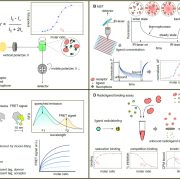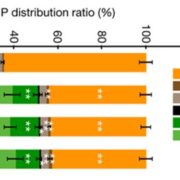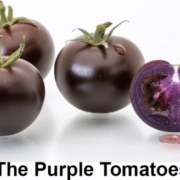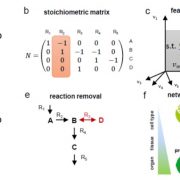Carbon nanotubes deliver functional genetic material into mature plants without DNA integration
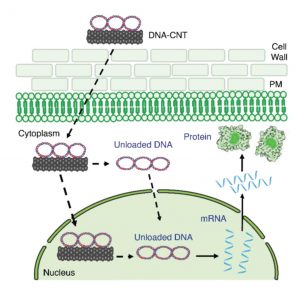 Introducing DNA or RNA into plant cells remains a challenge. et al. describe a new method for transient expression studies through delivery of DNA or RNA via carbon nanotubes (CNTs); the size of the nanoparticles is smaller than the exclusion limit for plant cell walls. The authors show that circular or linear DNA or small RNA can be “grafted” onto CNTs with high efficiency. Using a standard infiltration method (a small nick of the leaf epidermis and injection into leaf tissues using a needle-less syringe), the nanoparticles can readily be introduced into leaf tissues. Using Cy3-tagged CNTs and CNTs conjugated to GFP-encoding DNA, they showed that the DNA-CNT conjugates get into the plant cells and that the DNA is expressed. Expression was high at three days post-infilutration and greatly reduced after ten days, and no integration of DNA into the genome was detected. The authors also demonstrated silencing of constitutively expressed GFP by CNTs grafted to siRNAs targetting GFP. These studies provide a new tool for transient expression or silencing of genes in plants. (Summary by Mary Williams) bioRxiv
Introducing DNA or RNA into plant cells remains a challenge. et al. describe a new method for transient expression studies through delivery of DNA or RNA via carbon nanotubes (CNTs); the size of the nanoparticles is smaller than the exclusion limit for plant cell walls. The authors show that circular or linear DNA or small RNA can be “grafted” onto CNTs with high efficiency. Using a standard infiltration method (a small nick of the leaf epidermis and injection into leaf tissues using a needle-less syringe), the nanoparticles can readily be introduced into leaf tissues. Using Cy3-tagged CNTs and CNTs conjugated to GFP-encoding DNA, they showed that the DNA-CNT conjugates get into the plant cells and that the DNA is expressed. Expression was high at three days post-infilutration and greatly reduced after ten days, and no integration of DNA into the genome was detected. The authors also demonstrated silencing of constitutively expressed GFP by CNTs grafted to siRNAs targetting GFP. These studies provide a new tool for transient expression or silencing of genes in plants. (Summary by Mary Williams) bioRxiv


